Organisational Behaviour Report: M&S, Motivation, Teamwork
VerifiedAdded on 2023/06/05
|18
|4708
|463
Report
AI Summary
This report delves into the intricacies of organisational behaviour, specifically focusing on the impact of culture, politics, and power on individual and team performance within the context of Marks & Spencer. It explores the application of various motivational theories, including content and process theories such as Maslow's hierarchy, ERG theory, Hertzberg's two-factor theory, expectancy, equity, goal-setting, and reinforcement theories, to enhance employee motivation and achieve organisational goals. The report critically evaluates the relationship between these elements and their influence on team dynamics, suggesting strategies for fostering effective teamwork and improving business performance. Furthermore, it analyses the effectiveness of different motivational techniques and their role in influencing employee behaviour, ultimately aiming to provide recommendations for organisational success.

Organisational
Behaviour
1
Behaviour
1
Paraphrase This Document
Need a fresh take? Get an instant paraphrase of this document with our AI Paraphraser
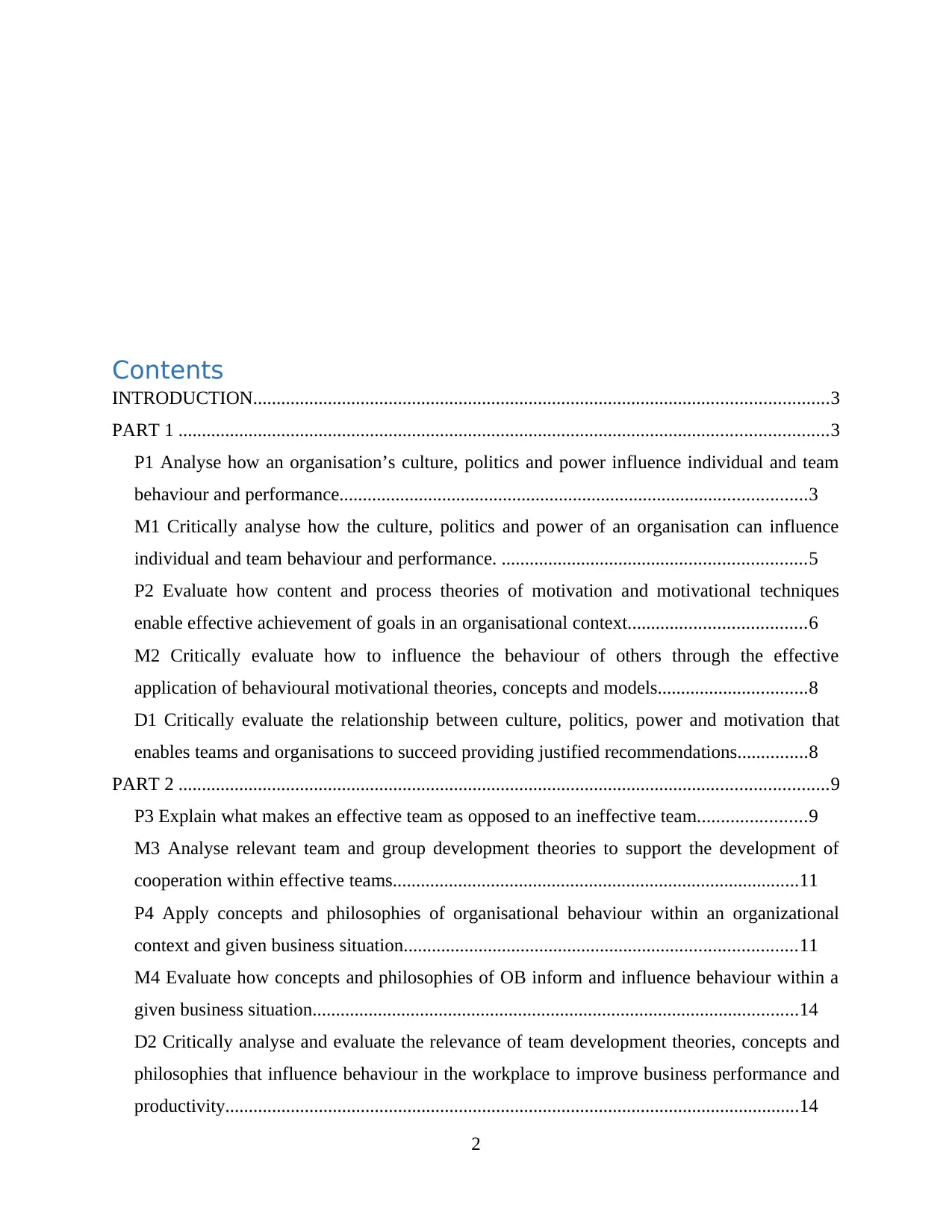
Contents
INTRODUCTION...........................................................................................................................3
PART 1 ...........................................................................................................................................3
P1 Analyse how an organisation’s culture, politics and power influence individual and team
behaviour and performance....................................................................................................3
M1 Critically analyse how the culture, politics and power of an organisation can influence
individual and team behaviour and performance. .................................................................5
P2 Evaluate how content and process theories of motivation and motivational techniques
enable effective achievement of goals in an organisational context......................................6
M2 Critically evaluate how to influence the behaviour of others through the effective
application of behavioural motivational theories, concepts and models................................8
D1 Critically evaluate the relationship between culture, politics, power and motivation that
enables teams and organisations to succeed providing justified recommendations...............8
PART 2 ...........................................................................................................................................9
P3 Explain what makes an effective team as opposed to an ineffective team.......................9
M3 Analyse relevant team and group development theories to support the development of
cooperation within effective teams.......................................................................................11
P4 Apply concepts and philosophies of organisational behaviour within an organizational
context and given business situation....................................................................................11
M4 Evaluate how concepts and philosophies of OB inform and influence behaviour within a
given business situation........................................................................................................14
D2 Critically analyse and evaluate the relevance of team development theories, concepts and
philosophies that influence behaviour in the workplace to improve business performance and
productivity...........................................................................................................................14
2
INTRODUCTION...........................................................................................................................3
PART 1 ...........................................................................................................................................3
P1 Analyse how an organisation’s culture, politics and power influence individual and team
behaviour and performance....................................................................................................3
M1 Critically analyse how the culture, politics and power of an organisation can influence
individual and team behaviour and performance. .................................................................5
P2 Evaluate how content and process theories of motivation and motivational techniques
enable effective achievement of goals in an organisational context......................................6
M2 Critically evaluate how to influence the behaviour of others through the effective
application of behavioural motivational theories, concepts and models................................8
D1 Critically evaluate the relationship between culture, politics, power and motivation that
enables teams and organisations to succeed providing justified recommendations...............8
PART 2 ...........................................................................................................................................9
P3 Explain what makes an effective team as opposed to an ineffective team.......................9
M3 Analyse relevant team and group development theories to support the development of
cooperation within effective teams.......................................................................................11
P4 Apply concepts and philosophies of organisational behaviour within an organizational
context and given business situation....................................................................................11
M4 Evaluate how concepts and philosophies of OB inform and influence behaviour within a
given business situation........................................................................................................14
D2 Critically analyse and evaluate the relevance of team development theories, concepts and
philosophies that influence behaviour in the workplace to improve business performance and
productivity...........................................................................................................................14
2
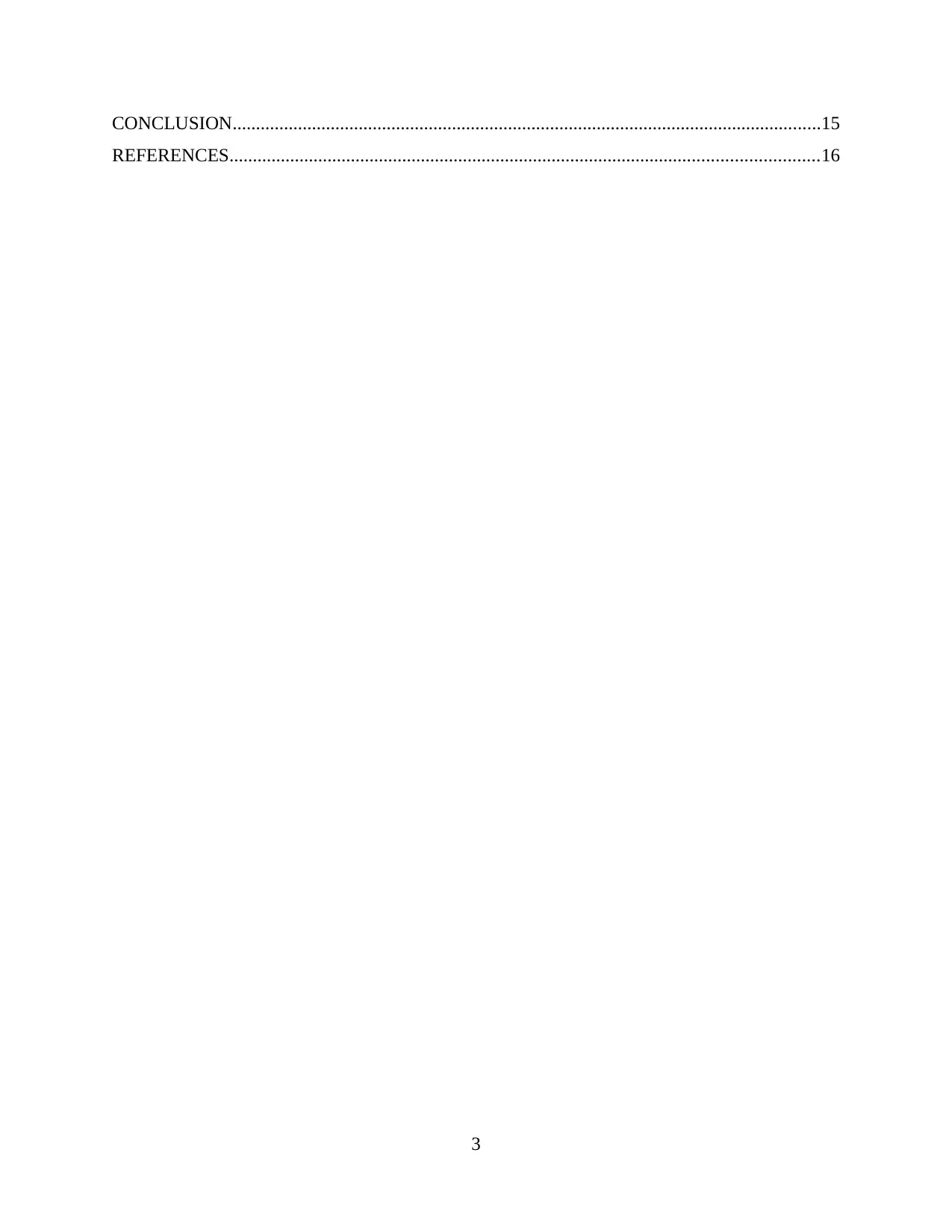
CONCLUSION..............................................................................................................................15
REFERENCES..............................................................................................................................16
3
REFERENCES..............................................................................................................................16
3
⊘ This is a preview!⊘
Do you want full access?
Subscribe today to unlock all pages.

Trusted by 1+ million students worldwide
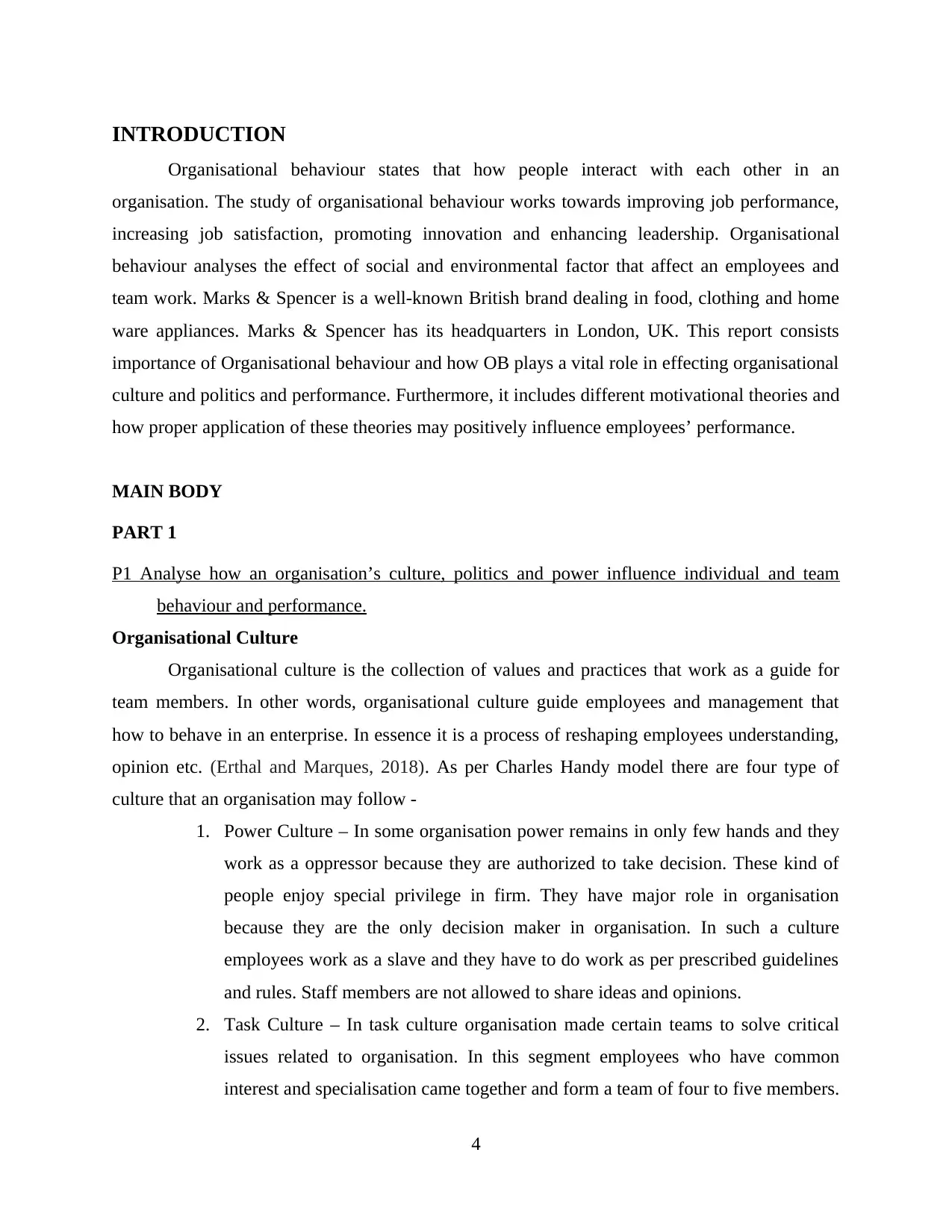
INTRODUCTION
Organisational behaviour states that how people interact with each other in an
organisation. The study of organisational behaviour works towards improving job performance,
increasing job satisfaction, promoting innovation and enhancing leadership. Organisational
behaviour analyses the effect of social and environmental factor that affect an employees and
team work. Marks & Spencer is a well-known British brand dealing in food, clothing and home
ware appliances. Marks & Spencer has its headquarters in London, UK. This report consists
importance of Organisational behaviour and how OB plays a vital role in effecting organisational
culture and politics and performance. Furthermore, it includes different motivational theories and
how proper application of these theories may positively influence employees’ performance.
MAIN BODY
PART 1
P1 Analyse how an organisation’s culture, politics and power influence individual and team
behaviour and performance.
Organisational Culture
Organisational culture is the collection of values and practices that work as a guide for
team members. In other words, organisational culture guide employees and management that
how to behave in an enterprise. In essence it is a process of reshaping employees understanding,
opinion etc. (Erthal and Marques, 2018). As per Charles Handy model there are four type of
culture that an organisation may follow -
1. Power Culture – In some organisation power remains in only few hands and they
work as a oppressor because they are authorized to take decision. These kind of
people enjoy special privilege in firm. They have major role in organisation
because they are the only decision maker in organisation. In such a culture
employees work as a slave and they have to do work as per prescribed guidelines
and rules. Staff members are not allowed to share ideas and opinions.
2. Task Culture – In task culture organisation made certain teams to solve critical
issues related to organisation. In this segment employees who have common
interest and specialisation came together and form a team of four to five members.
4
Organisational behaviour states that how people interact with each other in an
organisation. The study of organisational behaviour works towards improving job performance,
increasing job satisfaction, promoting innovation and enhancing leadership. Organisational
behaviour analyses the effect of social and environmental factor that affect an employees and
team work. Marks & Spencer is a well-known British brand dealing in food, clothing and home
ware appliances. Marks & Spencer has its headquarters in London, UK. This report consists
importance of Organisational behaviour and how OB plays a vital role in effecting organisational
culture and politics and performance. Furthermore, it includes different motivational theories and
how proper application of these theories may positively influence employees’ performance.
MAIN BODY
PART 1
P1 Analyse how an organisation’s culture, politics and power influence individual and team
behaviour and performance.
Organisational Culture
Organisational culture is the collection of values and practices that work as a guide for
team members. In other words, organisational culture guide employees and management that
how to behave in an enterprise. In essence it is a process of reshaping employees understanding,
opinion etc. (Erthal and Marques, 2018). As per Charles Handy model there are four type of
culture that an organisation may follow -
1. Power Culture – In some organisation power remains in only few hands and they
work as a oppressor because they are authorized to take decision. These kind of
people enjoy special privilege in firm. They have major role in organisation
because they are the only decision maker in organisation. In such a culture
employees work as a slave and they have to do work as per prescribed guidelines
and rules. Staff members are not allowed to share ideas and opinions.
2. Task Culture – In task culture organisation made certain teams to solve critical
issues related to organisation. In this segment employees who have common
interest and specialisation came together and form a team of four to five members.
4
Paraphrase This Document
Need a fresh take? Get an instant paraphrase of this document with our AI Paraphraser
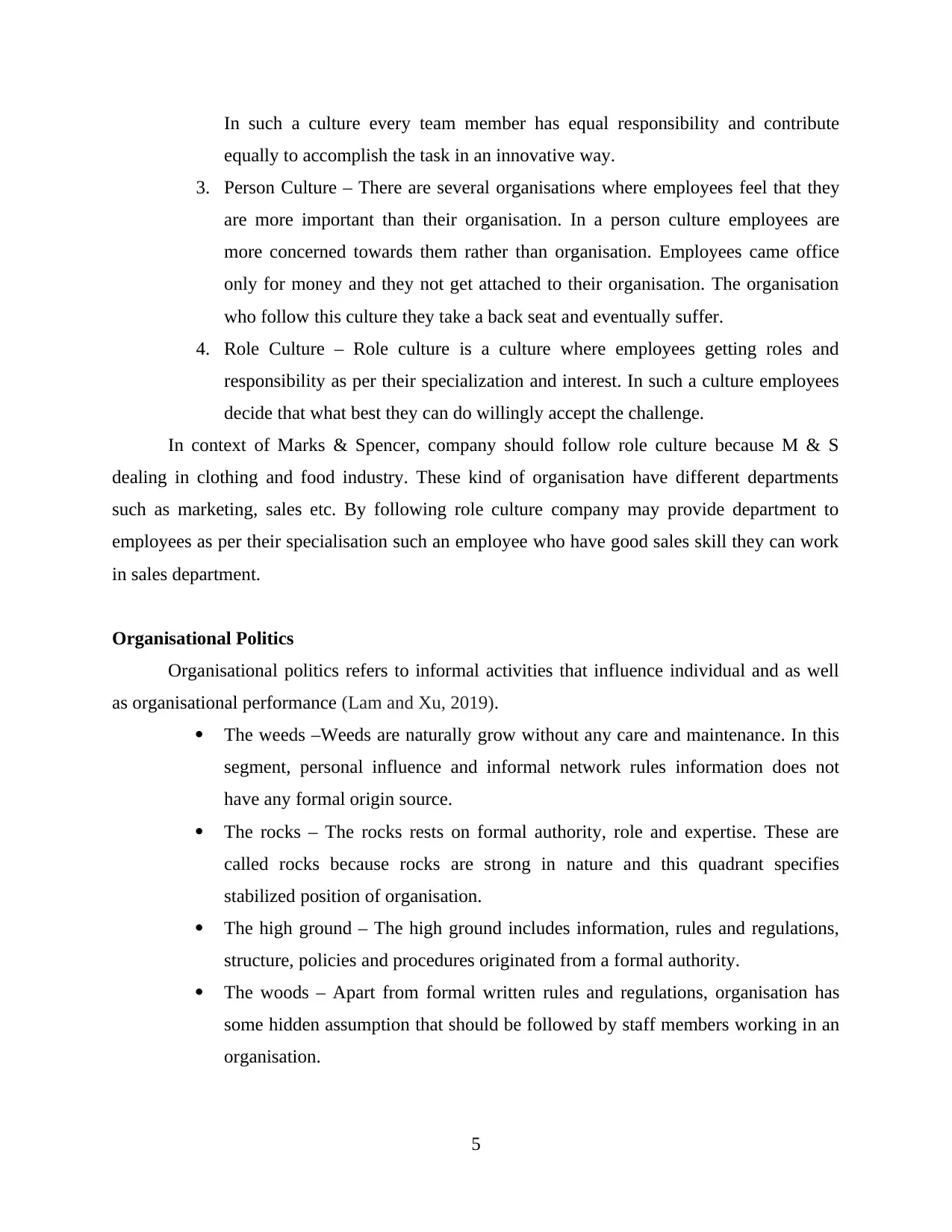
In such a culture every team member has equal responsibility and contribute
equally to accomplish the task in an innovative way.
3. Person Culture – There are several organisations where employees feel that they
are more important than their organisation. In a person culture employees are
more concerned towards them rather than organisation. Employees came office
only for money and they not get attached to their organisation. The organisation
who follow this culture they take a back seat and eventually suffer.
4. Role Culture – Role culture is a culture where employees getting roles and
responsibility as per their specialization and interest. In such a culture employees
decide that what best they can do willingly accept the challenge.
In context of Marks & Spencer, company should follow role culture because M & S
dealing in clothing and food industry. These kind of organisation have different departments
such as marketing, sales etc. By following role culture company may provide department to
employees as per their specialisation such an employee who have good sales skill they can work
in sales department.
Organisational Politics
Organisational politics refers to informal activities that influence individual and as well
as organisational performance (Lam and Xu, 2019).
The weeds –Weeds are naturally grow without any care and maintenance. In this
segment, personal influence and informal network rules information does not
have any formal origin source.
The rocks – The rocks rests on formal authority, role and expertise. These are
called rocks because rocks are strong in nature and this quadrant specifies
stabilized position of organisation.
The high ground – The high ground includes information, rules and regulations,
structure, policies and procedures originated from a formal authority.
The woods – Apart from formal written rules and regulations, organisation has
some hidden assumption that should be followed by staff members working in an
organisation.
5
equally to accomplish the task in an innovative way.
3. Person Culture – There are several organisations where employees feel that they
are more important than their organisation. In a person culture employees are
more concerned towards them rather than organisation. Employees came office
only for money and they not get attached to their organisation. The organisation
who follow this culture they take a back seat and eventually suffer.
4. Role Culture – Role culture is a culture where employees getting roles and
responsibility as per their specialization and interest. In such a culture employees
decide that what best they can do willingly accept the challenge.
In context of Marks & Spencer, company should follow role culture because M & S
dealing in clothing and food industry. These kind of organisation have different departments
such as marketing, sales etc. By following role culture company may provide department to
employees as per their specialisation such an employee who have good sales skill they can work
in sales department.
Organisational Politics
Organisational politics refers to informal activities that influence individual and as well
as organisational performance (Lam and Xu, 2019).
The weeds –Weeds are naturally grow without any care and maintenance. In this
segment, personal influence and informal network rules information does not
have any formal origin source.
The rocks – The rocks rests on formal authority, role and expertise. These are
called rocks because rocks are strong in nature and this quadrant specifies
stabilized position of organisation.
The high ground – The high ground includes information, rules and regulations,
structure, policies and procedures originated from a formal authority.
The woods – Apart from formal written rules and regulations, organisation has
some hidden assumption that should be followed by staff members working in an
organisation.
5
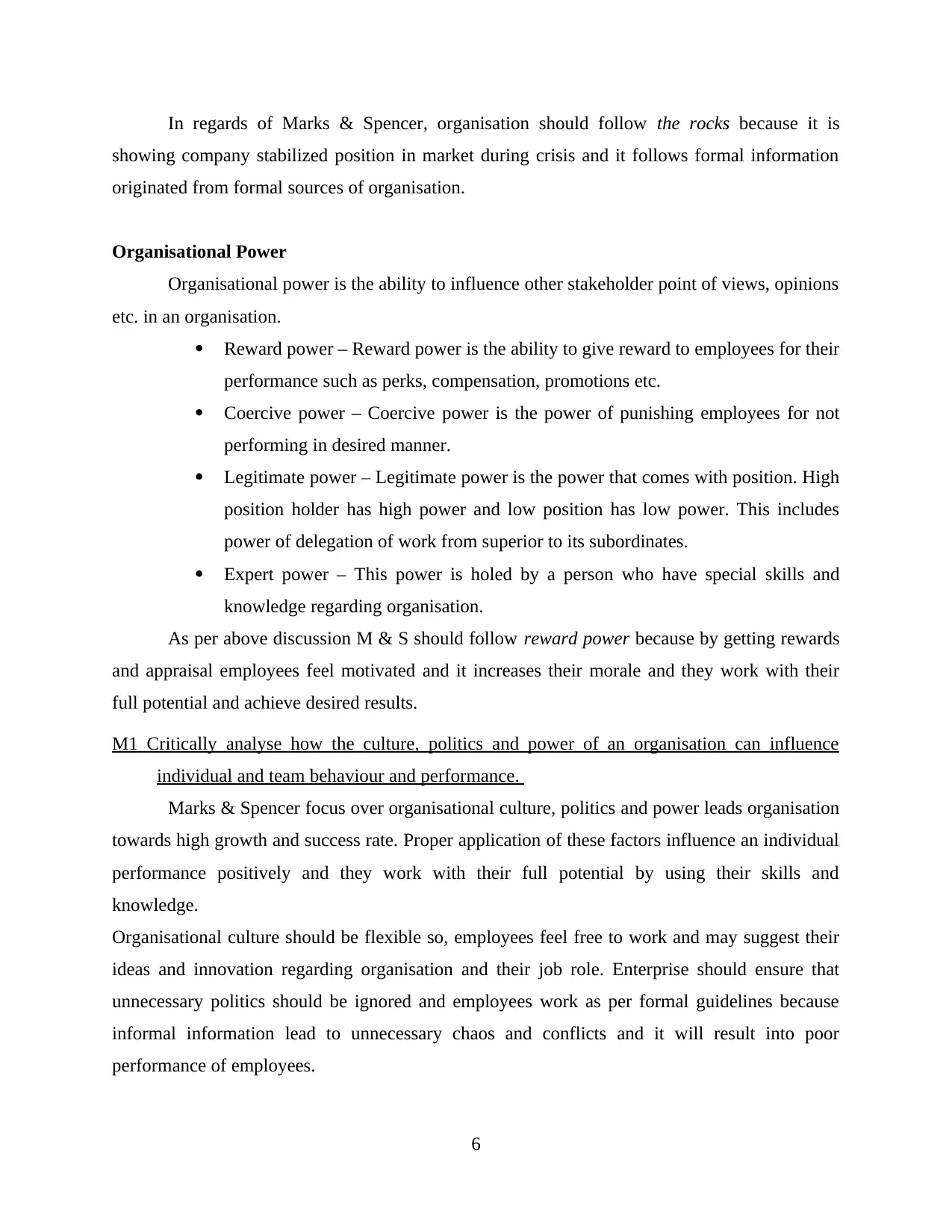
In regards of Marks & Spencer, organisation should follow the rocks because it is
showing company stabilized position in market during crisis and it follows formal information
originated from formal sources of organisation.
Organisational Power
Organisational power is the ability to influence other stakeholder point of views, opinions
etc. in an organisation.
Reward power – Reward power is the ability to give reward to employees for their
performance such as perks, compensation, promotions etc.
Coercive power – Coercive power is the power of punishing employees for not
performing in desired manner.
Legitimate power – Legitimate power is the power that comes with position. High
position holder has high power and low position has low power. This includes
power of delegation of work from superior to its subordinates.
Expert power – This power is holed by a person who have special skills and
knowledge regarding organisation.
As per above discussion M & S should follow reward power because by getting rewards
and appraisal employees feel motivated and it increases their morale and they work with their
full potential and achieve desired results.
M1 Critically analyse how the culture, politics and power of an organisation can influence
individual and team behaviour and performance.
Marks & Spencer focus over organisational culture, politics and power leads organisation
towards high growth and success rate. Proper application of these factors influence an individual
performance positively and they work with their full potential by using their skills and
knowledge.
Organisational culture should be flexible so, employees feel free to work and may suggest their
ideas and innovation regarding organisation and their job role. Enterprise should ensure that
unnecessary politics should be ignored and employees work as per formal guidelines because
informal information lead to unnecessary chaos and conflicts and it will result into poor
performance of employees.
6
showing company stabilized position in market during crisis and it follows formal information
originated from formal sources of organisation.
Organisational Power
Organisational power is the ability to influence other stakeholder point of views, opinions
etc. in an organisation.
Reward power – Reward power is the ability to give reward to employees for their
performance such as perks, compensation, promotions etc.
Coercive power – Coercive power is the power of punishing employees for not
performing in desired manner.
Legitimate power – Legitimate power is the power that comes with position. High
position holder has high power and low position has low power. This includes
power of delegation of work from superior to its subordinates.
Expert power – This power is holed by a person who have special skills and
knowledge regarding organisation.
As per above discussion M & S should follow reward power because by getting rewards
and appraisal employees feel motivated and it increases their morale and they work with their
full potential and achieve desired results.
M1 Critically analyse how the culture, politics and power of an organisation can influence
individual and team behaviour and performance.
Marks & Spencer focus over organisational culture, politics and power leads organisation
towards high growth and success rate. Proper application of these factors influence an individual
performance positively and they work with their full potential by using their skills and
knowledge.
Organisational culture should be flexible so, employees feel free to work and may suggest their
ideas and innovation regarding organisation and their job role. Enterprise should ensure that
unnecessary politics should be ignored and employees work as per formal guidelines because
informal information lead to unnecessary chaos and conflicts and it will result into poor
performance of employees.
6
⊘ This is a preview!⊘
Do you want full access?
Subscribe today to unlock all pages.

Trusted by 1+ million students worldwide
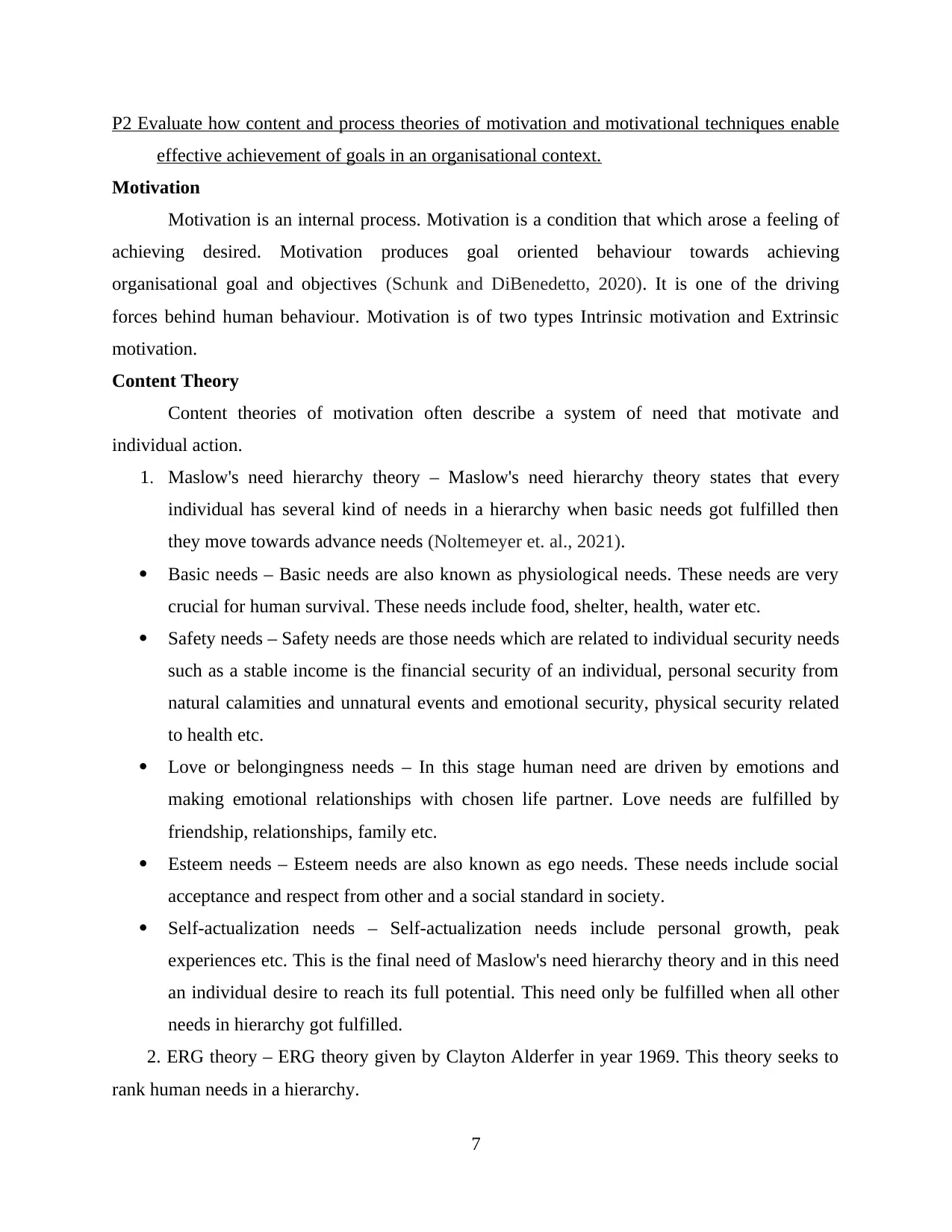
P2 Evaluate how content and process theories of motivation and motivational techniques enable
effective achievement of goals in an organisational context.
Motivation
Motivation is an internal process. Motivation is a condition that which arose a feeling of
achieving desired. Motivation produces goal oriented behaviour towards achieving
organisational goal and objectives (Schunk and DiBenedetto, 2020). It is one of the driving
forces behind human behaviour. Motivation is of two types Intrinsic motivation and Extrinsic
motivation.
Content Theory
Content theories of motivation often describe a system of need that motivate and
individual action.
1. Maslow's need hierarchy theory – Maslow's need hierarchy theory states that every
individual has several kind of needs in a hierarchy when basic needs got fulfilled then
they move towards advance needs (Noltemeyer et. al., 2021).
Basic needs – Basic needs are also known as physiological needs. These needs are very
crucial for human survival. These needs include food, shelter, health, water etc.
Safety needs – Safety needs are those needs which are related to individual security needs
such as a stable income is the financial security of an individual, personal security from
natural calamities and unnatural events and emotional security, physical security related
to health etc.
Love or belongingness needs – In this stage human need are driven by emotions and
making emotional relationships with chosen life partner. Love needs are fulfilled by
friendship, relationships, family etc.
Esteem needs – Esteem needs are also known as ego needs. These needs include social
acceptance and respect from other and a social standard in society.
Self-actualization needs – Self-actualization needs include personal growth, peak
experiences etc. This is the final need of Maslow's need hierarchy theory and in this need
an individual desire to reach its full potential. This need only be fulfilled when all other
needs in hierarchy got fulfilled.
2. ERG theory – ERG theory given by Clayton Alderfer in year 1969. This theory seeks to
rank human needs in a hierarchy.
7
effective achievement of goals in an organisational context.
Motivation
Motivation is an internal process. Motivation is a condition that which arose a feeling of
achieving desired. Motivation produces goal oriented behaviour towards achieving
organisational goal and objectives (Schunk and DiBenedetto, 2020). It is one of the driving
forces behind human behaviour. Motivation is of two types Intrinsic motivation and Extrinsic
motivation.
Content Theory
Content theories of motivation often describe a system of need that motivate and
individual action.
1. Maslow's need hierarchy theory – Maslow's need hierarchy theory states that every
individual has several kind of needs in a hierarchy when basic needs got fulfilled then
they move towards advance needs (Noltemeyer et. al., 2021).
Basic needs – Basic needs are also known as physiological needs. These needs are very
crucial for human survival. These needs include food, shelter, health, water etc.
Safety needs – Safety needs are those needs which are related to individual security needs
such as a stable income is the financial security of an individual, personal security from
natural calamities and unnatural events and emotional security, physical security related
to health etc.
Love or belongingness needs – In this stage human need are driven by emotions and
making emotional relationships with chosen life partner. Love needs are fulfilled by
friendship, relationships, family etc.
Esteem needs – Esteem needs are also known as ego needs. These needs include social
acceptance and respect from other and a social standard in society.
Self-actualization needs – Self-actualization needs include personal growth, peak
experiences etc. This is the final need of Maslow's need hierarchy theory and in this need
an individual desire to reach its full potential. This need only be fulfilled when all other
needs in hierarchy got fulfilled.
2. ERG theory – ERG theory given by Clayton Alderfer in year 1969. This theory seeks to
rank human needs in a hierarchy.
7
Paraphrase This Document
Need a fresh take? Get an instant paraphrase of this document with our AI Paraphraser
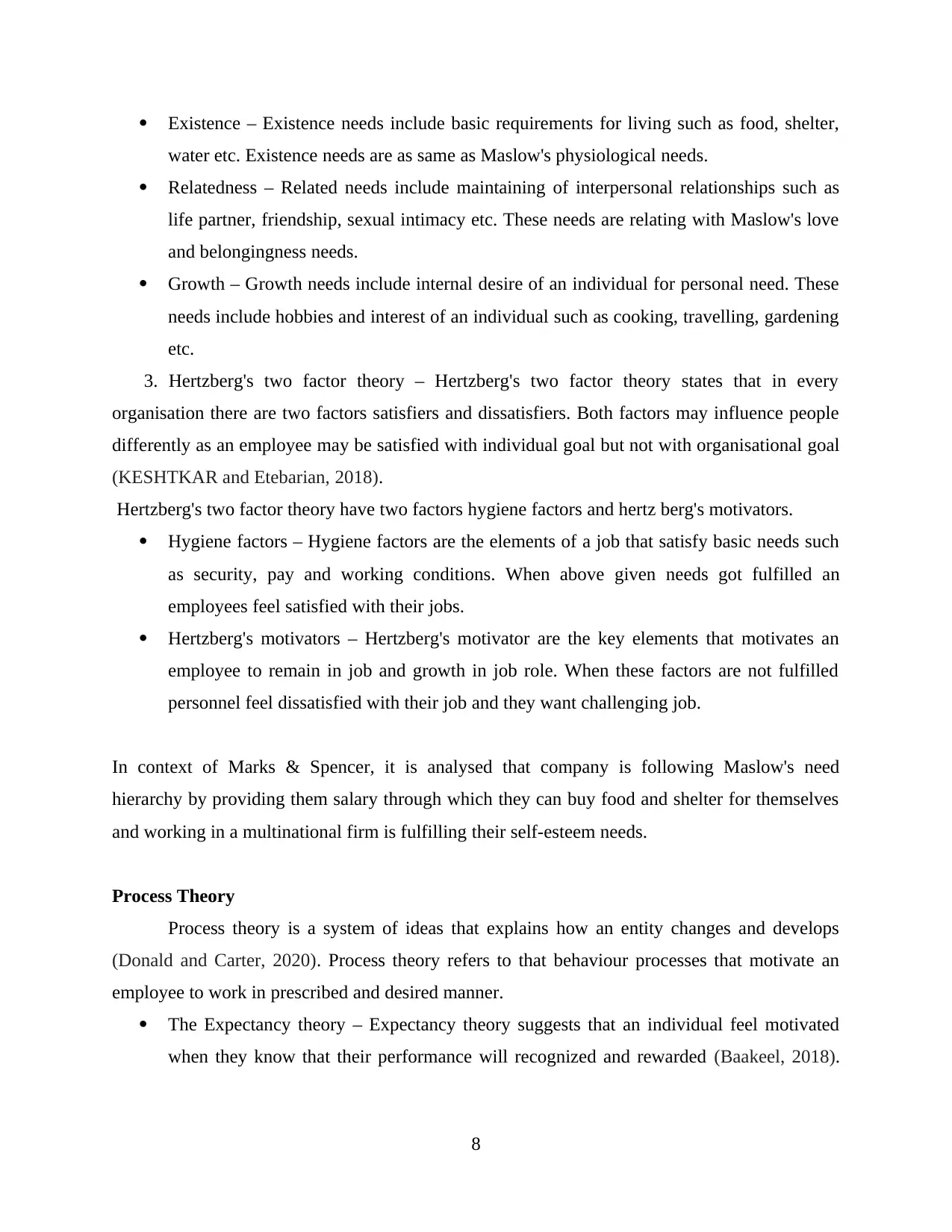
Existence – Existence needs include basic requirements for living such as food, shelter,
water etc. Existence needs are as same as Maslow's physiological needs.
Relatedness – Related needs include maintaining of interpersonal relationships such as
life partner, friendship, sexual intimacy etc. These needs are relating with Maslow's love
and belongingness needs.
Growth – Growth needs include internal desire of an individual for personal need. These
needs include hobbies and interest of an individual such as cooking, travelling, gardening
etc.
3. Hertzberg's two factor theory – Hertzberg's two factor theory states that in every
organisation there are two factors satisfiers and dissatisfiers. Both factors may influence people
differently as an employee may be satisfied with individual goal but not with organisational goal
(KESHTKAR and Etebarian, 2018).
Hertzberg's two factor theory have two factors hygiene factors and hertz berg's motivators.
Hygiene factors – Hygiene factors are the elements of a job that satisfy basic needs such
as security, pay and working conditions. When above given needs got fulfilled an
employees feel satisfied with their jobs.
Hertzberg's motivators – Hertzberg's motivator are the key elements that motivates an
employee to remain in job and growth in job role. When these factors are not fulfilled
personnel feel dissatisfied with their job and they want challenging job.
In context of Marks & Spencer, it is analysed that company is following Maslow's need
hierarchy by providing them salary through which they can buy food and shelter for themselves
and working in a multinational firm is fulfilling their self-esteem needs.
Process Theory
Process theory is a system of ideas that explains how an entity changes and develops
(Donald and Carter, 2020). Process theory refers to that behaviour processes that motivate an
employee to work in prescribed and desired manner.
The Expectancy theory – Expectancy theory suggests that an individual feel motivated
when they know that their performance will recognized and rewarded (Baakeel, 2018).
8
water etc. Existence needs are as same as Maslow's physiological needs.
Relatedness – Related needs include maintaining of interpersonal relationships such as
life partner, friendship, sexual intimacy etc. These needs are relating with Maslow's love
and belongingness needs.
Growth – Growth needs include internal desire of an individual for personal need. These
needs include hobbies and interest of an individual such as cooking, travelling, gardening
etc.
3. Hertzberg's two factor theory – Hertzberg's two factor theory states that in every
organisation there are two factors satisfiers and dissatisfiers. Both factors may influence people
differently as an employee may be satisfied with individual goal but not with organisational goal
(KESHTKAR and Etebarian, 2018).
Hertzberg's two factor theory have two factors hygiene factors and hertz berg's motivators.
Hygiene factors – Hygiene factors are the elements of a job that satisfy basic needs such
as security, pay and working conditions. When above given needs got fulfilled an
employees feel satisfied with their jobs.
Hertzberg's motivators – Hertzberg's motivator are the key elements that motivates an
employee to remain in job and growth in job role. When these factors are not fulfilled
personnel feel dissatisfied with their job and they want challenging job.
In context of Marks & Spencer, it is analysed that company is following Maslow's need
hierarchy by providing them salary through which they can buy food and shelter for themselves
and working in a multinational firm is fulfilling their self-esteem needs.
Process Theory
Process theory is a system of ideas that explains how an entity changes and develops
(Donald and Carter, 2020). Process theory refers to that behaviour processes that motivate an
employee to work in prescribed and desired manner.
The Expectancy theory – Expectancy theory suggests that an individual feel motivated
when they know that their performance will recognized and rewarded (Baakeel, 2018).
8
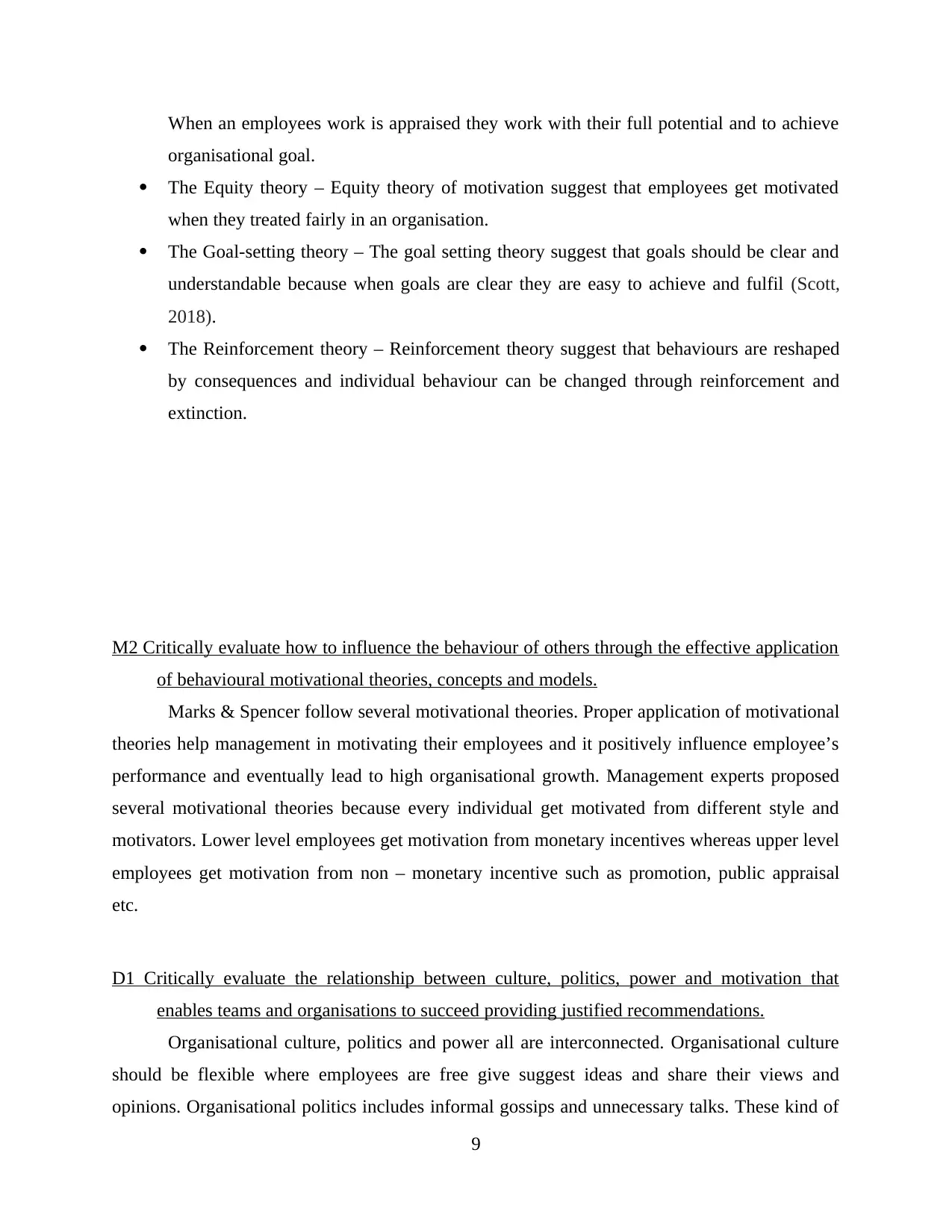
When an employees work is appraised they work with their full potential and to achieve
organisational goal.
The Equity theory – Equity theory of motivation suggest that employees get motivated
when they treated fairly in an organisation.
The Goal-setting theory – The goal setting theory suggest that goals should be clear and
understandable because when goals are clear they are easy to achieve and fulfil (Scott,
2018).
The Reinforcement theory – Reinforcement theory suggest that behaviours are reshaped
by consequences and individual behaviour can be changed through reinforcement and
extinction.
M2 Critically evaluate how to influence the behaviour of others through the effective application
of behavioural motivational theories, concepts and models.
Marks & Spencer follow several motivational theories. Proper application of motivational
theories help management in motivating their employees and it positively influence employee’s
performance and eventually lead to high organisational growth. Management experts proposed
several motivational theories because every individual get motivated from different style and
motivators. Lower level employees get motivation from monetary incentives whereas upper level
employees get motivation from non – monetary incentive such as promotion, public appraisal
etc.
D1 Critically evaluate the relationship between culture, politics, power and motivation that
enables teams and organisations to succeed providing justified recommendations.
Organisational culture, politics and power all are interconnected. Organisational culture
should be flexible where employees are free give suggest ideas and share their views and
opinions. Organisational politics includes informal gossips and unnecessary talks. These kind of
9
organisational goal.
The Equity theory – Equity theory of motivation suggest that employees get motivated
when they treated fairly in an organisation.
The Goal-setting theory – The goal setting theory suggest that goals should be clear and
understandable because when goals are clear they are easy to achieve and fulfil (Scott,
2018).
The Reinforcement theory – Reinforcement theory suggest that behaviours are reshaped
by consequences and individual behaviour can be changed through reinforcement and
extinction.
M2 Critically evaluate how to influence the behaviour of others through the effective application
of behavioural motivational theories, concepts and models.
Marks & Spencer follow several motivational theories. Proper application of motivational
theories help management in motivating their employees and it positively influence employee’s
performance and eventually lead to high organisational growth. Management experts proposed
several motivational theories because every individual get motivated from different style and
motivators. Lower level employees get motivation from monetary incentives whereas upper level
employees get motivation from non – monetary incentive such as promotion, public appraisal
etc.
D1 Critically evaluate the relationship between culture, politics, power and motivation that
enables teams and organisations to succeed providing justified recommendations.
Organisational culture, politics and power all are interconnected. Organisational culture
should be flexible where employees are free give suggest ideas and share their views and
opinions. Organisational politics includes informal gossips and unnecessary talks. These kind of
9
⊘ This is a preview!⊘
Do you want full access?
Subscribe today to unlock all pages.

Trusted by 1+ million students worldwide
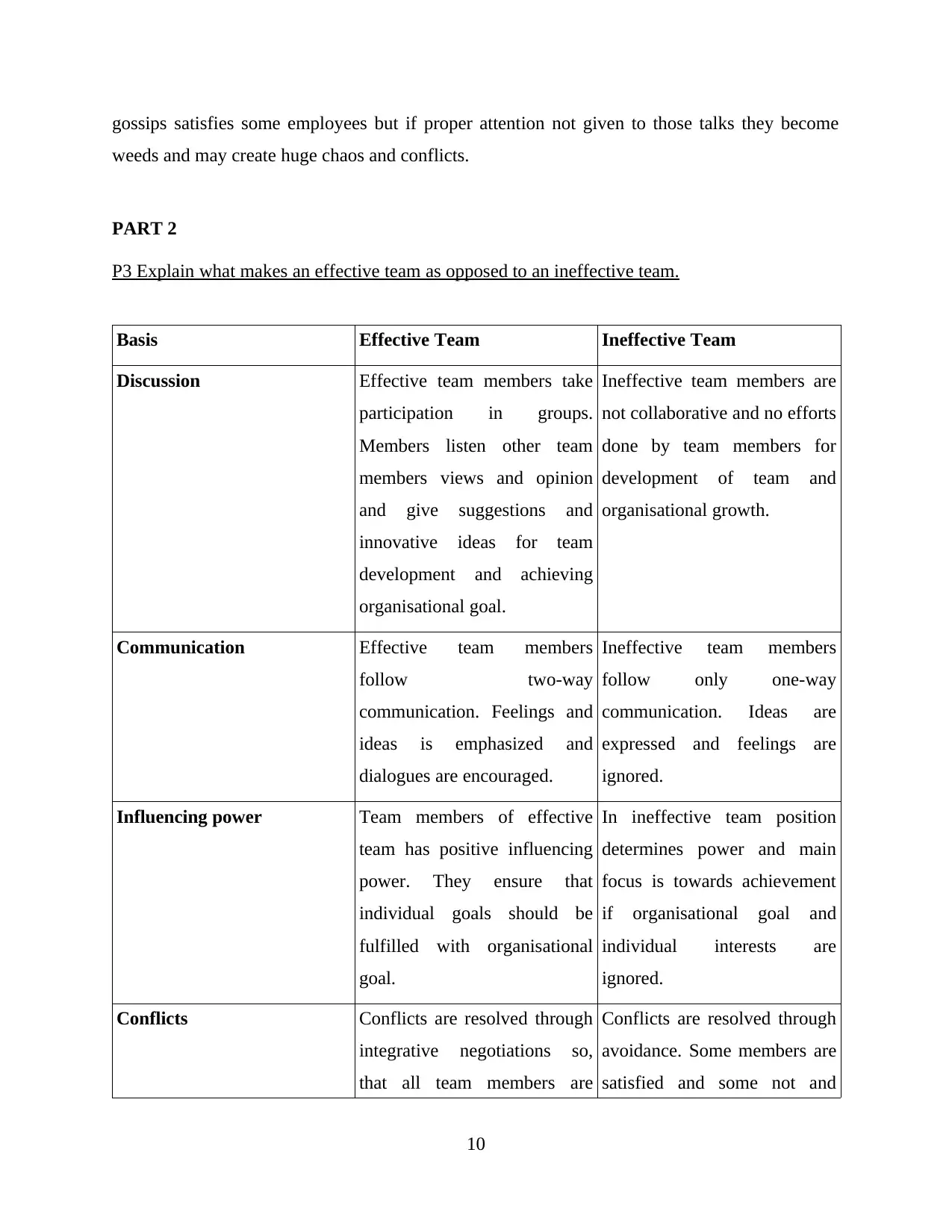
gossips satisfies some employees but if proper attention not given to those talks they become
weeds and may create huge chaos and conflicts.
PART 2
P3 Explain what makes an effective team as opposed to an ineffective team.
Basis Effective Team Ineffective Team
Discussion Effective team members take
participation in groups.
Members listen other team
members views and opinion
and give suggestions and
innovative ideas for team
development and achieving
organisational goal.
Ineffective team members are
not collaborative and no efforts
done by team members for
development of team and
organisational growth.
Communication Effective team members
follow two-way
communication. Feelings and
ideas is emphasized and
dialogues are encouraged.
Ineffective team members
follow only one-way
communication. Ideas are
expressed and feelings are
ignored.
Influencing power Team members of effective
team has positive influencing
power. They ensure that
individual goals should be
fulfilled with organisational
goal.
In ineffective team position
determines power and main
focus is towards achievement
if organisational goal and
individual interests are
ignored.
Conflicts Conflicts are resolved through
integrative negotiations so,
that all team members are
Conflicts are resolved through
avoidance. Some members are
satisfied and some not and
10
weeds and may create huge chaos and conflicts.
PART 2
P3 Explain what makes an effective team as opposed to an ineffective team.
Basis Effective Team Ineffective Team
Discussion Effective team members take
participation in groups.
Members listen other team
members views and opinion
and give suggestions and
innovative ideas for team
development and achieving
organisational goal.
Ineffective team members are
not collaborative and no efforts
done by team members for
development of team and
organisational growth.
Communication Effective team members
follow two-way
communication. Feelings and
ideas is emphasized and
dialogues are encouraged.
Ineffective team members
follow only one-way
communication. Ideas are
expressed and feelings are
ignored.
Influencing power Team members of effective
team has positive influencing
power. They ensure that
individual goals should be
fulfilled with organisational
goal.
In ineffective team position
determines power and main
focus is towards achievement
if organisational goal and
individual interests are
ignored.
Conflicts Conflicts are resolved through
integrative negotiations so,
that all team members are
Conflicts are resolved through
avoidance. Some members are
satisfied and some not and
10
Paraphrase This Document
Need a fresh take? Get an instant paraphrase of this document with our AI Paraphraser

satisfied. conflict gets ignored.
Tuckman Theory
Tuckman theory was proposed in year 1965 by psychologist Bruce Tuckman. This theory
suggest that teams will go through 5 stages of development forming, storming, norming,
performing and adjourning.
Forming – In this stage team is formed and task is allotted to team and team members
introduced to each other (Ferrell and Kline, 2018). Marks & Spencer form team in its
organisation while discussing employee’s skills, background and interests.
Storming – The storming stage starts when initial excitement gets over and employees
start complaining about task and deny to fulfil task. Marks & Spencer should develop an
effective management team who may clearly define goal and objectives of task.
Norming – This stage begins when storming settle down and employees agree to work
towards a common goal. Marks & Spencer has effective leaders to clear new doubts and
handle unexpected situation occur due to new task.
Performing – This is the stage where every team member is motivated and confident.
Every team member knows each other’s weakness and strength and familiar with each
other. Marks & Spencer conducting quarterly employees meet so that employees may
know each other and being familiar.
Adjourning – This stage is the final stage of Tuckman theory in this stage project end
organisational goals achieved team gets dispatched. However, if team members shared
positive experiences then employees want to work again with same team.
Belbin Theory
Belbin theory suggests that by understanding role in team an individual may work on its
strength and weaknesses as a team member and improve their performance in group (Lynch,
Lynch and Clemens, 2019).
Resource investigator – Resource investigator use their inquisitive nature to find ideas to
bring back to team.
Team worker – Team worker use their versatility to identify the work requirement and
complete it on the behalf of the team.
11
Tuckman Theory
Tuckman theory was proposed in year 1965 by psychologist Bruce Tuckman. This theory
suggest that teams will go through 5 stages of development forming, storming, norming,
performing and adjourning.
Forming – In this stage team is formed and task is allotted to team and team members
introduced to each other (Ferrell and Kline, 2018). Marks & Spencer form team in its
organisation while discussing employee’s skills, background and interests.
Storming – The storming stage starts when initial excitement gets over and employees
start complaining about task and deny to fulfil task. Marks & Spencer should develop an
effective management team who may clearly define goal and objectives of task.
Norming – This stage begins when storming settle down and employees agree to work
towards a common goal. Marks & Spencer has effective leaders to clear new doubts and
handle unexpected situation occur due to new task.
Performing – This is the stage where every team member is motivated and confident.
Every team member knows each other’s weakness and strength and familiar with each
other. Marks & Spencer conducting quarterly employees meet so that employees may
know each other and being familiar.
Adjourning – This stage is the final stage of Tuckman theory in this stage project end
organisational goals achieved team gets dispatched. However, if team members shared
positive experiences then employees want to work again with same team.
Belbin Theory
Belbin theory suggests that by understanding role in team an individual may work on its
strength and weaknesses as a team member and improve their performance in group (Lynch,
Lynch and Clemens, 2019).
Resource investigator – Resource investigator use their inquisitive nature to find ideas to
bring back to team.
Team worker – Team worker use their versatility to identify the work requirement and
complete it on the behalf of the team.
11
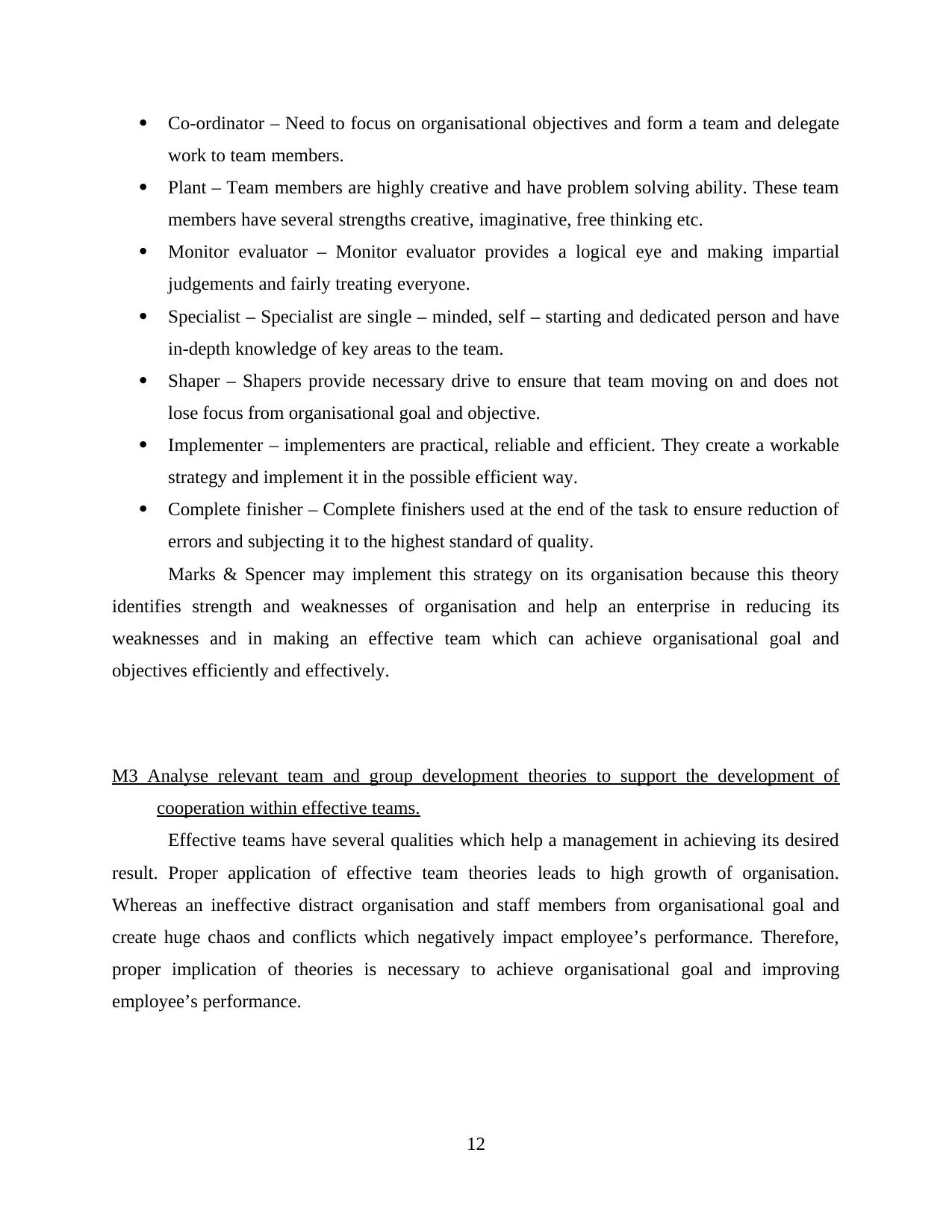
Co-ordinator – Need to focus on organisational objectives and form a team and delegate
work to team members.
Plant – Team members are highly creative and have problem solving ability. These team
members have several strengths creative, imaginative, free thinking etc.
Monitor evaluator – Monitor evaluator provides a logical eye and making impartial
judgements and fairly treating everyone.
Specialist – Specialist are single – minded, self – starting and dedicated person and have
in-depth knowledge of key areas to the team.
Shaper – Shapers provide necessary drive to ensure that team moving on and does not
lose focus from organisational goal and objective.
Implementer – implementers are practical, reliable and efficient. They create a workable
strategy and implement it in the possible efficient way.
Complete finisher – Complete finishers used at the end of the task to ensure reduction of
errors and subjecting it to the highest standard of quality.
Marks & Spencer may implement this strategy on its organisation because this theory
identifies strength and weaknesses of organisation and help an enterprise in reducing its
weaknesses and in making an effective team which can achieve organisational goal and
objectives efficiently and effectively.
M3 Analyse relevant team and group development theories to support the development of
cooperation within effective teams.
Effective teams have several qualities which help a management in achieving its desired
result. Proper application of effective team theories leads to high growth of organisation.
Whereas an ineffective distract organisation and staff members from organisational goal and
create huge chaos and conflicts which negatively impact employee’s performance. Therefore,
proper implication of theories is necessary to achieve organisational goal and improving
employee’s performance.
12
work to team members.
Plant – Team members are highly creative and have problem solving ability. These team
members have several strengths creative, imaginative, free thinking etc.
Monitor evaluator – Monitor evaluator provides a logical eye and making impartial
judgements and fairly treating everyone.
Specialist – Specialist are single – minded, self – starting and dedicated person and have
in-depth knowledge of key areas to the team.
Shaper – Shapers provide necessary drive to ensure that team moving on and does not
lose focus from organisational goal and objective.
Implementer – implementers are practical, reliable and efficient. They create a workable
strategy and implement it in the possible efficient way.
Complete finisher – Complete finishers used at the end of the task to ensure reduction of
errors and subjecting it to the highest standard of quality.
Marks & Spencer may implement this strategy on its organisation because this theory
identifies strength and weaknesses of organisation and help an enterprise in reducing its
weaknesses and in making an effective team which can achieve organisational goal and
objectives efficiently and effectively.
M3 Analyse relevant team and group development theories to support the development of
cooperation within effective teams.
Effective teams have several qualities which help a management in achieving its desired
result. Proper application of effective team theories leads to high growth of organisation.
Whereas an ineffective distract organisation and staff members from organisational goal and
create huge chaos and conflicts which negatively impact employee’s performance. Therefore,
proper implication of theories is necessary to achieve organisational goal and improving
employee’s performance.
12
⊘ This is a preview!⊘
Do you want full access?
Subscribe today to unlock all pages.

Trusted by 1+ million students worldwide
1 out of 18
Related Documents
Your All-in-One AI-Powered Toolkit for Academic Success.
+13062052269
info@desklib.com
Available 24*7 on WhatsApp / Email
![[object Object]](/_next/static/media/star-bottom.7253800d.svg)
Unlock your academic potential
Copyright © 2020–2026 A2Z Services. All Rights Reserved. Developed and managed by ZUCOL.


